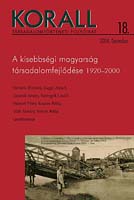A hatalom értelmisége – az értelmiség hatalma. A Földes László-ügy
Intellectuals in Power – the Power of the Intellectuals. The László Földes Case
Author(s): Stefano BottoniSubject(s): History
Published by: KORALL Társadalomtörténeti Egyesület
Keywords: social history; 20th century; Hungary; Hungarian minority; Romania; Transylvanian Hungarian intelligentsia; Romanian socialist politics of culture; Igaz Szó
Summary/Abstract: This study analyses the emergence and the development of the political conflict occurred in the second part of the 1950’s between two groups of left-wing intellectuals belonging to the Hungarian minority in Romania. Both of the groups gathered around literary reviews: the first around the Cluj-based Utunk (Our way), whose leader was the reform-oriented critic and aesthete László Földes, and the second around the Târgu-Mureş-based Igaz Szó (True Word), having as chief editor Győző Hajdu. After the Hungarian Revolution of 1956, the Hungarian élite loyal to the Romanian communist government found itself in crisis. While Hajdu condemned the so-called „counter-revolution”, while Földes manifested his dissatisfaction with the mass-repressions that took place both in Hungary and Romania. The conflict between the two groups reached its peak in 1958, when four writers from Târgu-Mureş denounced Földes. As a consequence, he was relieved of its position, expelled from the Party and he was forbidden to publish. The two most interesting aspects of this case are that, although it started as an inner minority issue, a competition between two elite groups, its resolution came through an “external” intervention from the political centre solicited by one of the factions. Moreover, the aftermath of the conflict gave the winners the illusion of possessing an increased power within the Romanian communist regime. However, several files of the secret police reveal that after 1956, the state of affairs of the Hungarian minority became a national security issue for the government. This brought to an increased control over them, leading to a situation in which not even themost loyal Hungarian intellectuals enjoyed the true confidence of the state.
Journal: Korall - Társadalomtörténeti folyóirat
- Issue Year: 2004
- Issue No: 18
- Page Range: 113-134
- Page Count: 22
- Language: Hungarian

